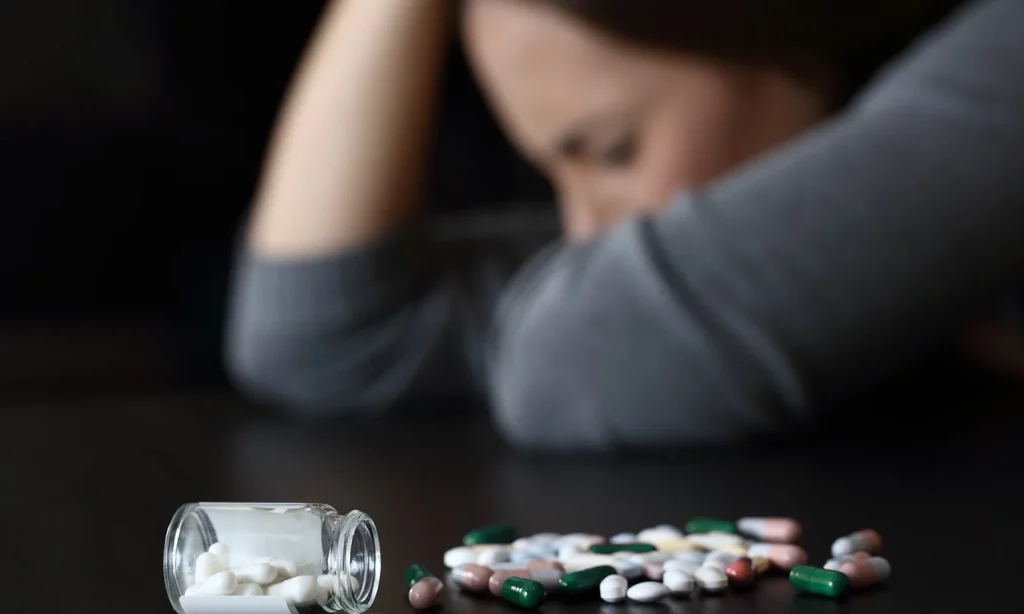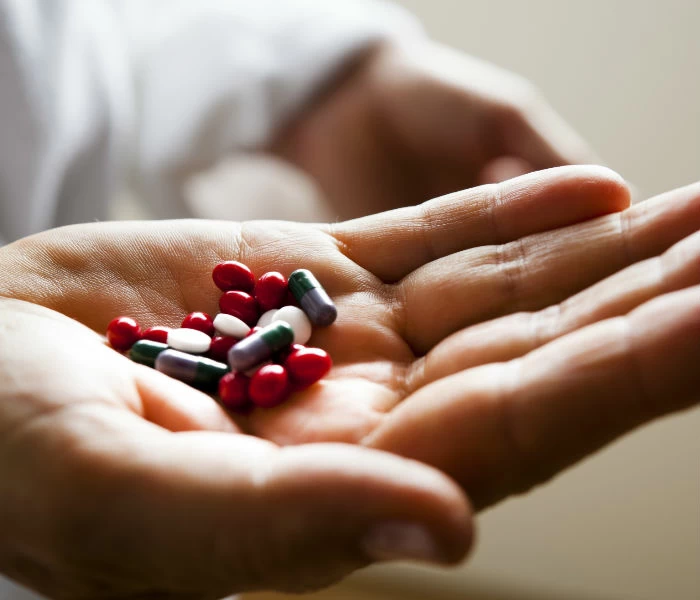What is Suboxone Psychosis?
Suboxone (buprenorphine/naloxone) is a brand-name prescription drug. It is an opioid prescription medication used for opioid addiction treatment. It can be used as an induction agent to stabilize someone in withdrawal during the medical detox process and for maintenance treatment to promote recovery from opioid use disorder. When a person stops using Suboxone, some people develop abrupt Suboxone withdrawal psychosis. The issue typically arises when patients stop taking their medications suddenly. The problem goes away when they start retaking their prescriptions.
Suboxone and Psychosis
Suboxone psychosis is much more likely if the patient has a history of mental health disorders or previous history of psychosis. Sudden discontinuation can lead to psychosis or other withdrawal symptoms without medical supervision. It is wise to always talk to your doctor before you stop taking any prescribed medication.
Can Suboxone Cause Withdrawal Psychosis?
Psychosis is not listed as a common side effect of Suboxone (buprenorphine/naloxone), and it is unlikely to cause psychosis when taken as directed. Buprenorphine-containing medications like Suboxone are effective and well-studied remedies for opioid use disorder (OUD). Psychosis refers to a mental state where there is a loss of contact with reality. Symptoms can include delusions (false beliefs) and hallucinations (seeing, hearing, or feeling things others do not).
However, some case reports have found a link between buprenorphine use and psychosis. However, it would be very unusual for Suboxone alone to cause psychosis without other underlying mental health conditions.
In others, the psychotic experiences were more significant during buprenorphine withdrawal. In other words, the symptoms arose when buprenorphine was leaving the body – in most cases, days after the last buprenorphine use. Withdrawal from other opioids, like heroin, can also precipitate psychosis.

Get Your Life Back
Find Hope & Recovery. Get Safe Comfortable Detox, Addiction Rehab & Dual Diagnosis High-Quality Care.
Hotline(844) 597-1011What Else Causes Suboxone Withdrawal Psychosis?
The drugs that are often reported in cases of drug-induced psychosis, and are most likely to result in psychotic symptoms, include Methamphetamine, psychedelic drugs such as LSD, and club drugs such as ecstasy and MDMA. Symptoms of psychosis can vary depending on which drugs have been taken and the quantity taken, but heavy and excessive use can result in prolonged symptoms.
Drugs such as cocaine, cannabis, and hallucinogens can also cause symptoms of psychosis but can also worsen symptoms of existing mental illnesses. Taking substances like cannabis for an extended period can also lead you to develop symptoms of psychosis, including paranoia. In high doses, THCs can induce temporary schizophrenia-like psychotic symptoms such as paranoia, delusions, anxiety, and hallucinations, as well as present other symptoms of cannabis addiction.
Drug-induced psychosis relating to prescription medication usually occurs when individuals are not taking the drug at the recommended dose or continuing to use the drug beyond the advised period, with drugs such as ketamine mimicking psychosis in the form of delusions and disordered thinking when abused.

Get Help. Get Better. Get Your Life Back.
Searching for Accredited Drug and Alcohol Rehab Centers Near You?
Even if you have failed previously and relapsed, or are in the middle of a difficult crisis, we stand ready to support you. Our trusted behavioral health specialists will not give up on you. When you feel ready or just want someone to speak to about therapy alternatives to change your life call us. Even if we cannot assist you, we will lead you to wherever you can get support. There is no obligation. Call our hotline today.
(844) 597-1011
Can Buprenorphine Reduce Psychotic Symptoms?
Yes. Buprenorphine can reduce psychotic symptoms. Recall that psychotic symptoms have rarely been reported to occur during withdrawal from buprenorphine. In many of these cases, restarting buprenorphine or other opioid resolved the hallucinations or delusions and alleviated psychosis. These cases have led researchers to investigate whether buprenorphine might be used as a therapeutic for people with psychosis.
However, a randomized controlled trial of buprenorphine for patients with bipolar disorder and OUD found that it had neither positive nor negative effects on psychotic symptoms compared to placebo. [1]
Side Effects of Suboxone Withdrawal
During withdrawal, your body is doing a lot of work. Thus, you can expect to experience specific physical and psychological symptoms, such as Suboxone induced psychosis. Co-occurring mental health issues may emerge. Some Suboxone detox and treatment facilities offer expert assistance in handling Suboxone withdrawal symptoms. A good treatment center aims to make your Suboxone detox experience as comfortable as possible.
Some of the most common physical symptoms of detox are:
- Hot or Cold Flashes: You may experience a sudden, intense feeling of either heat or coldness all over your body.
- Skin Abnormalities: You may feel physically uncomfortable in your skin or feel as if bugs are crawling on you. You also may develop goosebumps from time to time.
- Tiredness: As your body rids itself of Suboxone, you will likely feel fatigued.
- Muscle Discomfort: This may manifest as pain and cramps across your whole body.
- Drug Cravings: It is natural to experience both physical and mental Suboxone cravings.
- Sweating: Due to the dehydrating properties of Suboxone, sweating (and night sweats in particular) commonly occurs during withdrawal. Sweating is another avenue the body uses to remove Suboxone from your system.
- Nausea and Vomiting: Although unpleasant, these symptoms are common when withdrawing from drugs that impact the brain’s opioid receptors.
- Appetite Loss: A high-quality treatment center will ensure that you remain properly nourished, even if you do not feel like eating.
- Diarrhea: Not only is diarrhea uncomfortable, but it is also dehydrating. To mitigate this, you will need to drink lots of water and possibly even use some medications to help your body to better adjust to being without Suboxone.
Suboxone Withdrawal Cant Sleep
Insomnia can snowball into other withdrawal problems. But a medically-assisted detox prioritizes good sleep for everyone undergoing drug detoxification. Sleep aid medications or therapies may help you get much-needed rest while in treatment.
Some of the most common psychological symptoms of drug detox are:
- Irritability or Moodiness: Your brain is no longer receiving floods of dopamine. You may be irritable, especially during the beginning stages of the Suboxone detox.
- Depression and Suicidality: Unfortunately, these unpleasant feelings may occur. The medical staff must keep in close touch with each patient undergoing detox. If your depression is severe, your treatment team may consider medicinal remedies.
- Anxiety: It is normal to feel anxious when learning to live without Suboxone. Anxiety symptoms will subside as you adjust. Like depression, severe anxiety may call for a drug-based remedy.
- Other Co-Occurring Disorders: In addition to depression and anxiety, withdrawal can cause underlying mental health problems to erupt and rise to the surface. For example, say that a woman has been using Suboxone for ten years because it numbs her feelings of anger and emptiness. When she detoxes from the drug, she will feel those emotions without the blinders of Suboxone. She may have suffered from borderline personality disorder for many years without knowing her condition. These feelings can be disconcerting, especially if she has never seen a psychiatrist or other diagnostician who could provide information about the reasons behind her intense feelings.
Suboxone Withdrawal Timeline
Suboxone withdrawal neither takes place all at once nor carries on forever. Instead, it is a multi-stage process. The symptoms of withdrawal suboxone may cause appear during the detox process. Note that these times may differ for you, depending on your unique body chemistry.
Days 1 – 3
Physical symptoms may appear within 6 – 12 hours after you last misused Suboxone. You may experience muscle pain, nausea, and diarrhea, but your treatment team can provide medications to ease these symptoms.
Days 4 – 7
You may experience insomnia as your body eradicates the Suboxone. This is when you may begin to feel some of the psychological effects of withdrawal, including anxiety and irritability.
Weeks 2 – 4
Once the first week is complete, many people become more prone to depression. Your treatment team can help you through this co-occurring disorder with talk therapy and possibly medicinal intervention.
Month 2+
At this point, relapse prevention is crucial. Suboxone is out of your system, but your brain is still wired to crave the drug. Suboxone cravings can occur years after you’ve used the drug.
First-class Facilities & Amenities
World-class High-Quality Addiction & Mental Health Rehabilitation Treatment
Rehab Centers TourRenowned Addiction Centers. Serene Private Facilities. Inpatient rehab programs vary.
Addiction Helpline(844) 597-1011Proven recovery success experience, backed by a Team w/ History of:
15+
Years of Unified Experience
100s
5-Star Reviews Across Our Centers
10K
Recovery Success Stories Across Our Network
- Low Patient to Therapist Ratio
- Onsite Medical Detox Center
- Comprehensive Dual-Diagnosis Treatment
- Complimentary Family & Alumni Programs
- Coaching, Recovery & Personal Development Events
Suboxone Induced Psychosis & Suboxone Withdrawal Psychosis
It is not common to experience Suboxone withdrawal psychosis, but different studies have shown that it is not impossible. The symptoms of Suboxone-induced psychosis are often gradual, with the drug’s toxicity becoming more dangerous as the frequency and dosage of the drug increase with dependency. Suppose you have an underlying mental health condition; using psychoactive drugs will likely worsen your symptoms, result in extreme paranoia, and can speed up the onset of psychotic disorders such as bipolar disorder and schizophrenia. Extensive use of drugs and alcohol can also cause symptoms of psychosis to occur even if you aren’t diagnosed with co-occurring mental illness.
Some of the symptoms of Suboxone induced psychosis include:
- Paranoia
- Delusions
- Auditory and visual hallucinations
- Anti-social behavior
- Panic attacks
- Confusion
World-class, Accredited, 5-Star Reviewed, Effective Addiction & Mental Health Programs. Complete Behavioral Health Inpatient Rehab, Detox plus Co-occuring Disorders Therapy.
CALL(844) 597-1011End the Addiction Pain. End the Emotional Rollercoaster. Get Your Life Back. Start Drug, Alcohol & Dual Diagnosis Mental Health Treatment Now. Get Free No-obligation Guidance by Substance Abuse Specialists Who Understand Addiction & Mental Health Recovery & Know How to Help.
What Happens If I Stop Taking Suboxone Cold Turkey?
Suboxone, which contains buprenorphine and naloxone, can be an effective medication for opiate dependence. Still, sometimes, it must be taken for long periods after the user has stopped using addictive opioids. Can you quit Suboxone cold turkey? Despite its effectiveness, Suboxone can also be addictive, producing similar opioid withdrawal effects if you stop taking it “cold turkey.”
Side Effects Of Quitting Suboxone Cold Turkey
- Nausea and vomiting
- Muscle and body aches
- Anxiety, depression, and irritability
- Fever or chills
- Sweating and Headaches
Suboxone Withdrawal Cold Turkey
The symptoms can vary in severity and duration, depending on how long users have been taking Suboxone, as well as the dosage of the drug. Generally, most physical withdrawal symptoms will subside after one month, though psychological dependence can remain. Suboxone Withdrawal Symptoms are the worst in the first 72 hours. This is when most physical symptoms are experienced. Then, in the first week after discontinuation of Suboxone, symptoms generally subside to general aches and pains in the body, as well as insomnia and mood swings. After the second week, depression is the most prominent symptom.
After one month, users will likely still be experiencing intense cravings and depression. This is the most delicate time after stopping Suboxone use, as users have a potential for relapse. If you or a loved one is suffering from addiction to suboxone, please seek help immediately from a treatment professional. Like any other addictive substance, withdrawal from Suboxone can last several months. Though the significant physical symptoms will cease after a month of not taking the drug, psychological symptoms can go on for several months.

Suboxone Detox Treatment
Suboxone withdrawal psychosis is a condition that can cause significant health, social and economic problems that should not be taken lightly. We Level Up rehab treatment & detox center can provide you, or someone you love, the tools to recover from addiction with professional and safe Suboxone detox.
If you detox at home, you lack constant supervision at a medical detox facility. Often, withdrawal symptoms become so unmanageable that addicts have no choice but to return to Suboxone use. In addition to comfort, safety is also an issue with a home Suboxone detox. It is highly unusual to die from Suboxone withdrawal, but there are risks. For example, you may develop severe depression and suicidality due to the drop in dopamine flowing in your brain.
Feel free to call us to speak with one of our counselors. We can inform you about this condition by giving you relevant information. Our specialists know what you are going through. Each call is private and confidential.
Experience Transformative Recovery at We Level Up Treatment Centers.
See our authentic success stories. Get inspired. Get the help you deserve.
Start a New Life
Begin with a free call to an addiction & behavioral health treatment advisor. Learn more about our dual-diagnosis programs. The We Level Up Treatment Center Network delivers recovery programs that vary by each treatment facility. Call to learn more.
- Personalized Care
- Caring Accountable Staff
- World-class Amenities
- Licensed & Accredited
- Renowned w/ 100s 5-Star Reviews
We’ll Call You


